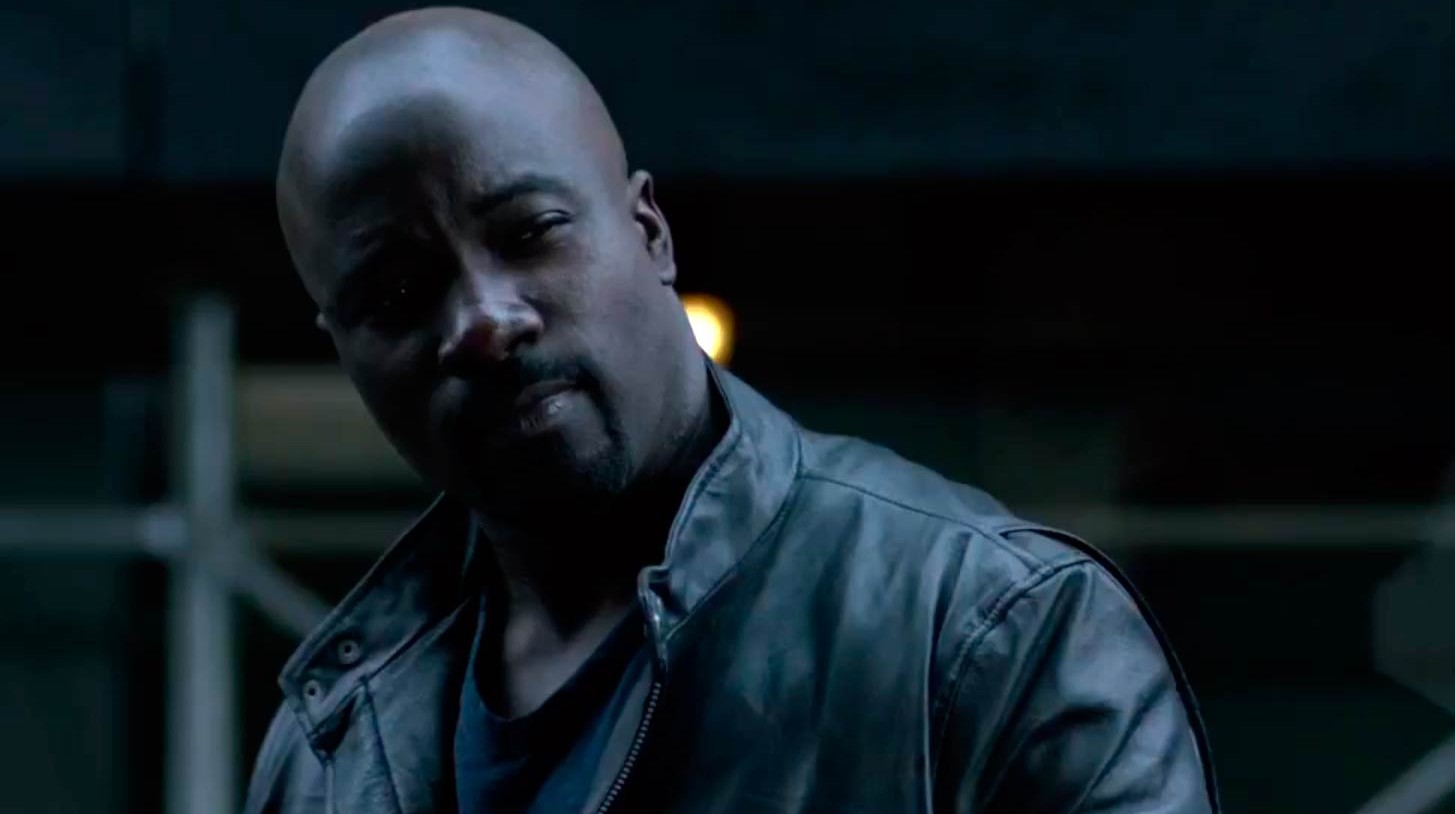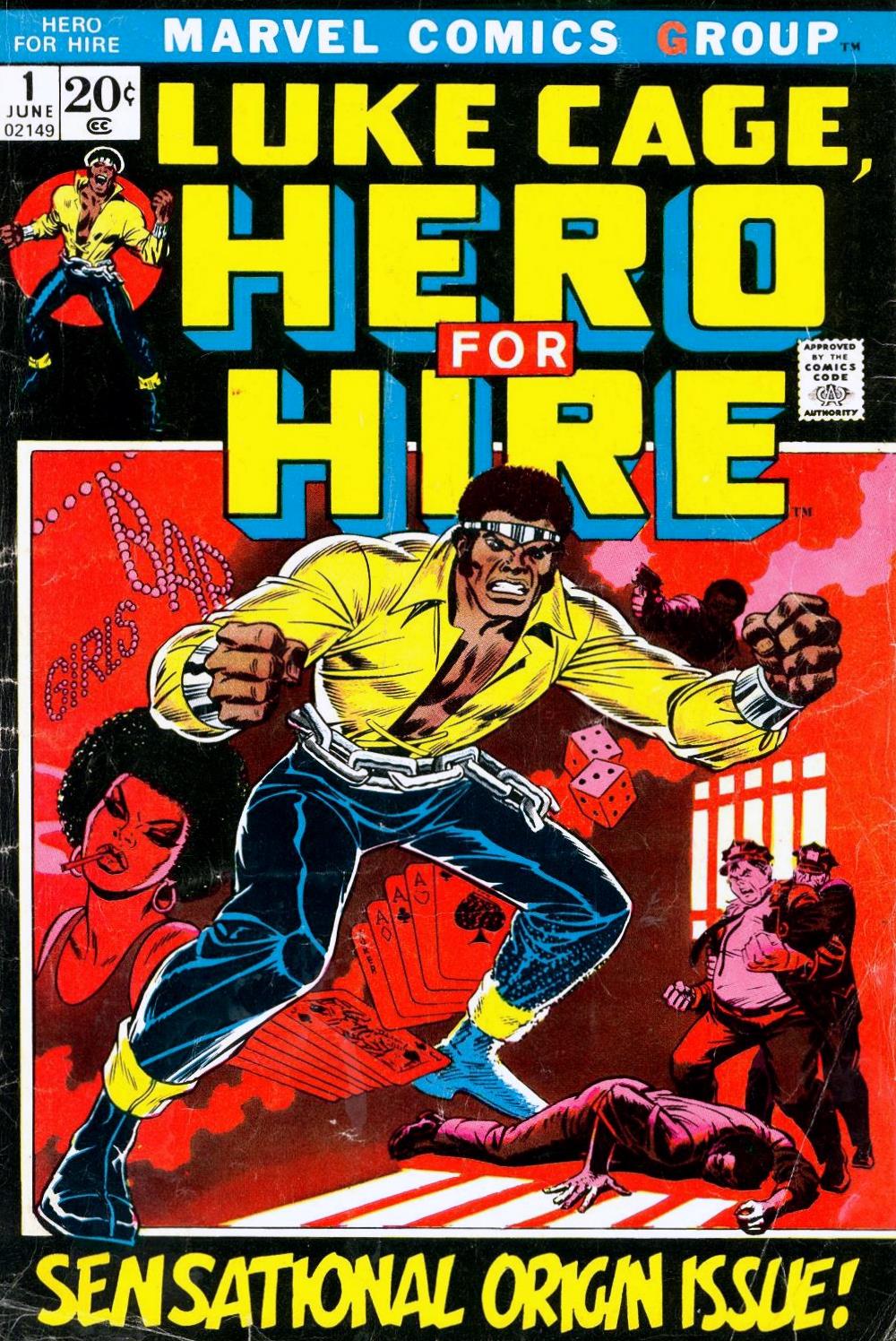STOP!
Like it says in the title, there are spoilers. If you haven't seen it, finished it, or are in the middle of it, stop reading this right now and go watch. Skip this post until you've seen the series in its entirety.
***Spoilers ahead!***
Last chance!
Alright, if you've come this far you've either watched or don't give a shit about knowing what happens ahead of time so here we go!
First, when something as highly anticipated as this is finally released there's always a danger that expectations become unreasonable and the product is doomed to fall short, even if the story is good. Ghostbusters, Star Wars: The Force Awakens, and Avatar 2 come to mind. (trust me, the fail is coming)
For a few episodes, Luke Cage had all the earmarks of disappointment...
| Thank God they didn't stay too faithful to the source material |
Cottonmouth was an idiot crime boss. Granted, my view is somewhat skewed by the fact I was comparing him to Ghost from Starz's hit series "Power" but Cornell Stokes couldn't even measure up to his in-universe counterpart from Hell's Kitchen, Wilson Fisk. Both had the NYPD on the payroll, hired goons, and a particular disdain for their respective heroes but you always got the sense that Fisk was a genuine threat. His reach, ambition, and intelligence made Daredevil seem truly out of his depth trying to take him down. Cottonmouth? He felt like a boy wearing his father's shoes. He was never in control, reacted with emotion, and make mistakes that had me constantly rolling my eyes. I just wanted Cage to punch him the face so we could end this story...and my misery. Hell, Ma Mabel was scarier. A hero is only as good as his adversary and Cottonmouth just didn't seem compelling enough to push Cage to the heights I hoped he'd reach. Cage himself seemed miscast. Michael Colter's soft-spoken demeanor was perfect in a supporting role to "Jessica Jones" but as the focus of his own series? I kept imagining my drill sergeant screaming "SOUND OFF LIKE YOU'VE GOT A PAIR!" He doesn't talk, he mumbles. This is supposed to be the 3rd strongest character in the MCU behind Thor and the Hulk and he sounded like he was afraid to be heard!
I was ready to give up on the series until Episode 7: "Manifest." Cottonmouth went from being an idiot crime boss to a man who should never have been one in the first place. He may have had little regard for the lives of those who crossed him but he still had a shred of humanity. He mourned the death of his longtime friend, "Pop," paid for his funeral in full, and executed his murderer, Tone (played by my fellow ICB brother Warner Miller! Congratulations!). He complained to Shades that, "there's supposed to be rules to this shit," emphasizing that a neutral player like Pop shouldn't have died. He was angry that his childhood was stolen, being forced to kill the only man who saw him as anything other than the heir to Ma Mabel's empire. In the end, Cornell was just another victim of the Stokes family legacy, figuratively, and then, literally. Ma Mabel murdered his soul long before his cousin, Mariah, finished the job. In retrospect, his death was the perfect series pivot. It was the also death of Mariah's denial about who she truly was, it gave "Shades" an opening to reveal himself fully, and shifted the series focus from the sins of the Stokes' family to the sins of the Lucas's. And more they delved into Cage's history, the more Colter's laid back portrayal made sense. Willis was more extroverted because he was chasing his father's acceptance. Everything about him screamed "look at ME!" Carl, the more reserved brother, felt obligated to live up to the family name but would've much rather lived without the spotlight. He wasn't meant to be as brash as his comic book counterpart. The MCU Luke Cage is the quintessential gentle giant and from that perspective, Colter's performance was perfect.
| These need to become the definitive versions of the characters |
Diamondback, though not the cerebral villain archetype I enjoy, was a much better challenge for Cage. Willis Stryker didn't just embrace his dark side, he's so evil he became Cage's dark side too. Diamondback doesn't care about rules or people the way Cottonmouth did. He is singularly focused. Driven to not just kill Carl Lucas but burn everything he ever touched to the ground. His very presence forces Cage to rip open old wounds he'd been running from since we were first introduced to the character in "Jessica Jones." He's the embodiment of Cage's failures and their consequences. He's actually what people fear a man with Cage's abilities could become. Unchecked power.
| Unlimited POOOOWWWWAAAAAAAAAAA!!!!! |
There are times the show gets preachy. The scene where Luke almost goes on a historical rant about Crispus Attucks smacks of the writers putting their main character on a soapbox but it's forgivable. Most folks watching probably don't know who he is. It also presses the hot button issues of police brutality and the myth of black fatherlessness more than once. (A myth that's been disproven but somehow keeps finding its way into popular media.) What's not a myth, however, is the damage being an "outside child" can do. For every son left behind and forced to watch his half siblings be treated like the "real" kids, for every child denied their father's last name or even public recognition, and for every child that will never know what it's like to have a father who cares enough, Diamondback embodies that rage and how it can destroy you if you let it. A nice touch, on the other hand, is the blend of the blaxploitation style and the infusion of hip-hop into the fabric of the series. Not only is the soundtrack unapologetically hip hop, but if your memory is sharp and your listening catalog deep enough, you'll catch some famous lines woven into the dialogue almost every episode. Like, "Lemonade is popular drink...and it still is," during Misty Knight's interrogation scene in Episode 9: DWYCK. Also, every episode is named after a Gang Starr song (RIP Guru). The easter eggs are plentiful and I think more than enough to satisfy long-time readers, like Misty Knight's makeover into her comic book appearance in the season finale, Misty almost losing her arm, Cage donning the classic 70s costume after his escape from Seagate, Luke refusing to be called a "Hero for Hire," and Pop's insistence on calling Luke "Power Man."
"Luke Cage" feels like it was made for us by us and has enough action and connection with the rest of the MCU that it's accessible to everyone, dropping some knowledge about black culture along the way. This show was written by conscious black nerds who read comics and listened to everything from Slick Rick to Method Man (who's cameo had me grinning like Cage) and it shows. It's a groundbreaking show and though it could treat its female characters with a little more respect (Claire comes off like a Magical Negro character and Misty Knight's story isn't advanced at all by having her sleep with Cage for starters), it shows that a show can succeed by being honest and upfront about difficult, too often ignored topics. The audience has lived through many of them and its willingness to include those issues head on make it all the more relatable.
#blackheroesmatter
Sweet Christmas! Well Done, Marvel...well done.
 |
| Yo Danny...You're Next! |
 |
| On my way... |

